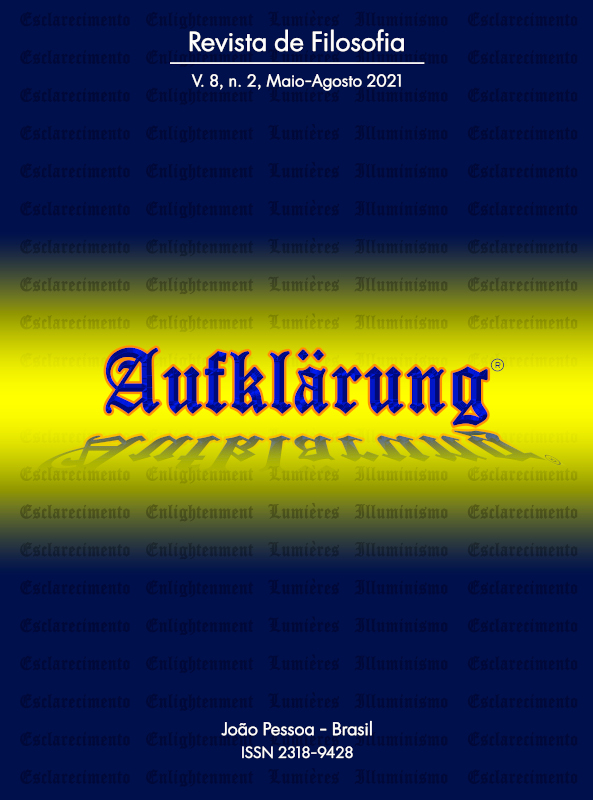African decolonization and the criticism to the European anthropological dualism: when the other of modernity ponders, corrects and educates the modernity
DOI:
https://doi.org/10.18012/arf.v8i2.57424Keywords:
European Modernity, Other of Modernity, Anthropological Dualism, Eurocentrism-Colonialism-Racism, Criticism of ModernityAbstract
The paper discusses the criticism performed by African decolonization regarding European anthropological dualism that serves as basis to the constitution of the philosophical-sociological-anthropological discourse of Western modernity-modernization, which implies (a) in the split, separation, autonomy, independence, endogeny, self-referentiality, self-subsistence, self-sufficiency and superposition of Europe in relation over all others of Europe, correlatively to (b) the legitimation of Europe, by means of rationalization, as effective present, substantive actuality and orientation to the future, the only paradigmatic-normative instance which is capable of ground, legitimize and implement the non-ethnocentric and non-egocentric universalism and with condition to generate criticism, reflexivity, mobility and emancipation, contrarily to all others of modernity who, as undifferentiated soup and absolute generalization demarcated by a mythic condition, are conceived as pre-modern and anti-modern perspective and, in this sense, as anthropological past, unable to generate criticism, reflexivity, mobility and transformation along the time, being charaterized for dogmatism-fundamentalism and contextualism-particularism. African decolonization, by means of the triad eurocentrism-colonialism-racism as fascism, will deconstruct the anthropological dualism, the historical-sociologica blindness and the normative-philosophical romanticization of Western rationalism and, from the voice-praxis of the minorized-colonized subjects constructed by Europe in terms of structural racism, will furnish a new perspective of a non-ethnocentric and non-egocentric universalism which can be generated and sustained only as decolonization, that is, as overcoming of the anthropological dualism and of the consequent political-moral dualism that, as structural racism, have streamlined the asymmetric relationship of Europe to non-European peoples in terms of usurpation, instrumentalization, construction of political-cultural minorities and, as the crowning point of all these, realization of etnocides-genocides against Black and Indigenous peoples.
Downloads
References
CÉSAIRE, Aimé. Discurso sobre o colonialismo. Lisboa: Livraria Sá da Costa Editora, 1978.
DARWIN, Charles. A origem do homem e a seleção sexual. São Paulo: Hemus, 1974.
FANON, Frantz. Os condenados da terra. Rio de Janeiro: Paz e Terra, 1968.
FANON, Frantz. Pele negra, máscaras brancas. Salvador: Editora da UFBA, 2008.
HABERMAS, Jürgen. Teoria do agir comunicativo (Vol. I): racionalidade da ação e racionalização social. São Paulo: Martins Fontes, 2012a.
HABERMAS, Jürgen. Teoria do agir comunicativo (Vol. II): sobre a crítica da razão funcionalista. São Paulo: Martins Fontes, 2012b.
HABERMAS, Jürgen. O discurso filosófico da modernidade: doze lições. São Paulo: Martins Fontes, 2002a.
HABERMAS, Jürgen. A inclusão do outros: estudos de teoria política. São Paulo: Loyola, 2002b.
HONNETH, Axel. Luta por reconhecimento: a gramática moral dos conflitos sociais. São Paulo: Editora 34, 2003.
KRENAK, Ailton. Encontros. Rio de Janeiro: Azougue Editorial, 2015.
MBEMBE, Achille. Sair da grande noite: ensaio sobre a África descolonizada. Luanda: Edições Mulemba, 2014a.
MBEMBE, Achille. Crítica da razão negra. Lisboa: Antígona, 2014b.
MEMMI, Aimé. Retrato do colonizado precedido pelo retrato do colonizador. Rio de Janeiro: Civilização Brasileira, 1967.
QUIJANO, Aníbal. “Colonialidad y Modernidad/Racionalidade”, Perú Indígena, vol. 13, nº. 29, p. 11-20, 1992.
QUIJANO, Aníbal. “Colonialidade do poder, eurocentrismo e América Latina”, p. 125-142. In: CLACSO (Org.). A colonialidade do saber: eurocentrismo e ciências sociais. Buenos Aires: CLACSO Editora, 2005.
SCHELER, Max. A diferença essencial entre o homem e o animal. Lisboa: Lusofia, 2008.
WEBER, Max. Ensayos de sociología de la religión (T. I). Madrid: Taurus, 1984.
WERÁ JECUPÉ, Kaká. Ore Awé Roiru’a Ma: todas as vezes que dissemos adeus. São Paulo: Peirópolis, 2002.
Additional Files
Published
How to Cite
Issue
Section
License

This work is licensed under a Creative Commons Attribution 4.0 International License.
Journal general policy
1.This journal works under a Creative Commons License aplied to online journals. That icence can be read in the following link: Creative Commons Attribution 4.0 International (CC BY 4.0).
2.Accordingly to this License, a)the journal declares that authors hold the copyright of their articles without restrictions, and they can archieve them as post-print elsewhere. b)the journal allow the author(s) to retain publishing rights without restrictions.
Metadata Policy for information describing items in the repository
1. Anyone may access the metadata free of charge at anytime.
2.The metadata may be re-used in any medium without prior permission, even commercial purposes provided the OAI Identifier or a link to the original metadata record are given, under the terms of a CC BY license refered for the Journal.







































